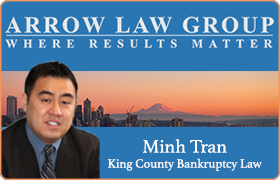Gold Bar Bankruptcy Lawyer, Washington
Sponsored Law Firm
-
 x
x

Click For More Info:
-
Arrow Law Group, PLLC
1904 3rd Ave., Ste 930, Seattle, WA 98101 » view mapKing County Bankruptcy Lawyer Where Results Matter
Arrow Law Group works together to devote their practice to helping people resolve issues related to debts, personal injury, family law, criminal defense, and immigration.
800-821-3170  Minh T. Tran Seattle, WA
Minh T. Tran Seattle, WAAttorney At Law - WA, 2009
Michigan State, J.D.
 Contact UsEmail or Call 24/7
Contact UsEmail or Call 24/7Contact Arrow Law Group, PLLC today
Includes: Bankruptcy Litigation, Commercial Bankruptcy, Consumer Bankruptcy, Dissolution
Jeffrey C. Wishko
Complex Litigation, Cleanup & Superfund, Collective Bargaining, Bankruptcy Litigation
Status: In Good Standing
Jocelynne Rose Fallgatter
Land Use & Zoning, Estate Planning, Consumer Bankruptcy, Legal Malpractice
Status: In Good Standing Licensed: 13 Years
Lawrence Freeman Brown
International Tax, Estate Planning, Business & Trade, Commercial Bankruptcy
Status: In Good Standing Licensed: 35 Years
Nancy Ann Gass
Estate Planning, Family Law, Contract, Bankruptcy
Status: In Good Standing Licensed: 9 Years
Daren Hood Nitz
Securities, Corporate, Contract, Commercial Bankruptcy
Status: In Good Standing Licensed: 34 Years
Douglas Leo Batey
Business, Commercial Bankruptcy, Corporate, Business & Trade
Status: In Good Standing Licensed: 44 Years
Peter D Heinz
Contract, Commercial Bankruptcy, Corporate, Business & Trade
Status: Inactive Licensed: 43 Years


 Minh T. Tran Seattle, WA
Minh T. Tran Seattle, WA Contact UsEmail or Call 24/7
Contact UsEmail or Call 24/7
